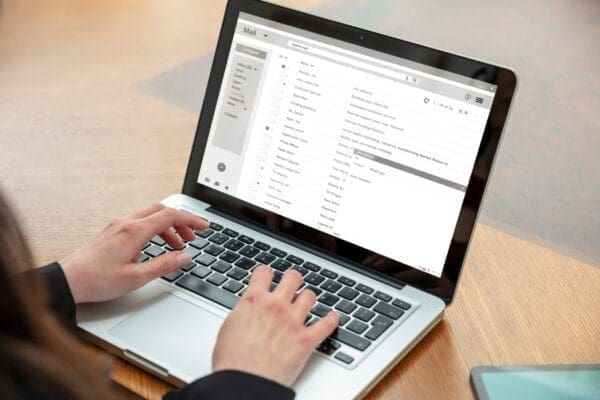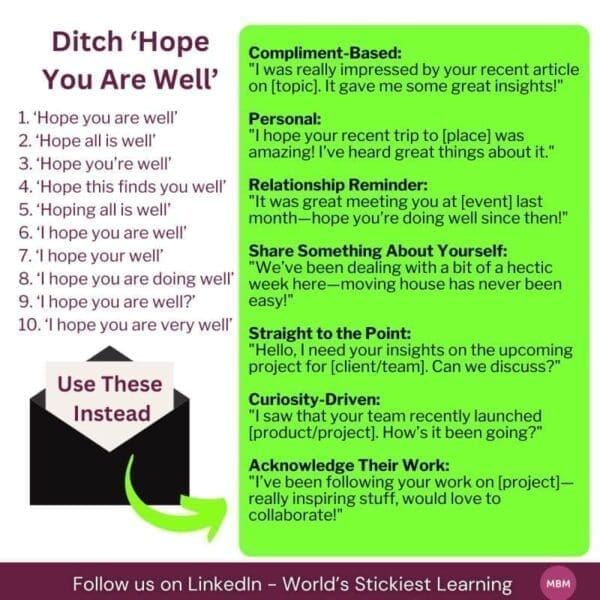Since the First Email was Sent in 1971 We’ve Been Using ‘Hope You are Well’. It’s Time to Retire This Outdated Greeting and Make it More Useful.
Does the email greeting matter?
Yes.
It’s the first thing you read in an email and we all know how important first impressions are. Even if it’s not the first email, it’s saying something about you each time. Using the ‘hope you are well’ says nothing. It’s saying that you don’t know what to say and so you put the ubiquitous greeting used by everyone else. You are a sheep. Not a thought leader. It’s the equivalent of the paper straw cover in McDonald’s or the tin foil lid on a can of San Pellegrino or an ashtray in a rental car next to the no smoking sign. It’s meh.
If we have to use this outdated greeting, let’s take a look at using it correctly. Then, we can see some alternatives that are better to use later in this article.
Hope You are Well
Here it is in all its glorious forms:
- 1. ‘Hope you are well’
- 2. ‘Hope all is well’
- 3. ‘Hope you’re well’
- 4. ‘Hope this finds you well’
- 5. ‘Hoping all is well’
- 6. ‘I hope you are well’
- 7. ‘I hope your well’
- 8. ‘I hope you are doing well’
- 9. ‘I hope you are well?’
- 10. ‘I hope you are very well’

‘Hope You are Well’
This is lazy because it doesn’t even have the ‘I’, and comes across as insincere too because it is just ‘going through the motions’.
‘Hope All is Well’
Mr Lazy thinks big picture!
Sticky Learning ® is 7 times more effective than 1-day training courses. Plus, you will get a Chain of Evidence proving your Return on Investment. Discover soft skills training that changes behaviours long term.

Hope You’re Well’
It’s the slang version of Mr Lazy above.
‘Hope This Finds You Well’
Didn’t Mr Lazy use that in pen letters 30 years ago?!
‘Hoping All is Well’
See above.
‘I Hope You are Well’
Grammatically correct is a start, but it’s still meh.
‘I Hope You are Doing Well’
Well, I am definitely doing, doing something.
‘I Hope Your Well’

Teeth grinding. Grammatically incorrect. Does it matter? To some it does. It matters to me. It says that you can’t spell and that you can’t even be bothered to click on the fuzzy line underneath to find out why. In case you still don’t know ‘your’ should be ‘you’re’ or ‘you are’, because your is for sentences like ‘This is your car’. It’s generally used for possession.
‘I Hope You are Well?’
Are you asking me a question? In which case it’s ‘Are you well?’. If you are trying to combine a greeting of hoping that I am well with a question, well that’s not going to work. Pick one or the other. Not both, and certainly don’t attempt to combine them.
Summarising Hope You are Well
If you have to use it, please use it correctly. I suggest that the best of a bad bunch is:
‘I hope you are very well’
It is grammatically correct. The problem with grammar is that by getting it right, those that know grammar just expect it. It doesn’t get you a positive feel. It’s more of a neutral feeling where it goes unnoticed. Whereas poor grammar, to those that know their grammar, comes across badly. It is noticed. The words come across as either the person being lazy because they did not check it using the built-in tools, or they come across as uneducated.
The best of the bad bunch above works best because ‘I’ makes it personal and ‘Very’ adds a little something that suggests sincerity. So, if you must please choose this one. If you are now thinking about what else could I use, please read on…
Alternative to ‘I Hope You are Very Well’
The reason that hope you are well, or any version of it, became popular is because it can be used for anyone and everyone. It’s quick and impersonal, yet accepted by all as the opener. I believe that we can upgrade the opener because it can achieve a little more. Maybe we don’t do this for everyone, but some. Those that matter more. The first impression on a new client or someone we want to impress internally.

The challenge is over-familiarity versus interest. You don’t want to use ‘How is your newborn child?’ when you are emailing someone for the first time and you know because you have been stalking them online. That would be creepy. Equally, ‘I hope the weather is good where you are’ smacks of trying to be personal whilst losing something because you have no idea in the world where they are and you’ve just told them so.
Some Examples You Could Use
Give a Compliment:
‘I loved your work on the XYZ project’.
As Dale Carnegie wrote in his book ‘How to win friends and influence people‘, compliments work. The response is likely to be replied to with a thanks or reciprocated.
The author told us in the book everyone appreciates sincere appreciation, in fact, people crave it, and the reader will benefit by showing generous appreciation to others. Nevertheless, he cautions us not to use flattery in place of appreciation. People can see through insincere flattery and they will hate you for it. Therefore, any praise or compliment given should be true and should come from the heart. Don’t focus so much on people’s faults, even if they are overwhelmingly glaring. Rather, focus on the good things, even the little things they do right, and praise those things.
Be Personal:
‘I hope your holiday in the Maldives was fabulous!’.
It shows that you took enough care to remember not only that they were on holiday but that you remembered where. They’ll probably reply by sharing a little something about their holiday. This will help with the intimacy part of the trust formula.
A Reminder of Your Relationship:

‘We met at the conference in July’, or ‘You and I were at the meeting of Client ABC’, or ‘We both know John’.
NLP anchoring is powerful and this opener will anchor them with a warm feeling about your relationship, which should promote an effective email exchange. They may reply building on the relationship with something like, ‘yes, John. Mad as a fish but we love him dearly’.
Share Something about Yourself:
‘We’re in the process of moving house and we’ll be glad when we are in’.
Everyone has moved house and it’s a good common ground because most people have found the event stressful and so you have a common ‘enemy’. By sharing something about yourself, in influencing terms, you are pushing, rather than pulling. This is a great tool to improve your influencing skills. The other person is likely to tell you about their house move and so you are building common ground.
Straight to it:
‘Hello. I need your help on the promotional project from marketing.’
Don’t have an email opener, instead start with what you need. Just ‘Hello’ and then straight into what you need. They are likely to reply ignoring an opener too, and just getting on with business.
Using the Email Opening Alternatives
Yes, it can take a little longer. If first impressions matter and they do, and trust is the key to getting people to do what you want, then it’s the whole ball game. Building the third part of the trust formula – intimacy – is important. In negotiation the more we know about each other (intimacy) the research tells us that the better the win:win out for us both. It won’t always work, but what’s the alternative?
I hope your well”
Surely, we can do better. Can’t we?




